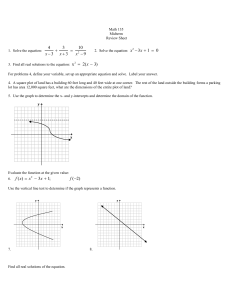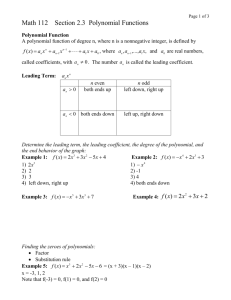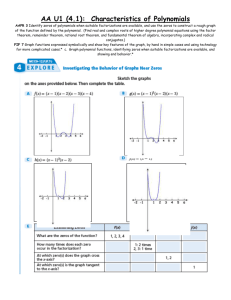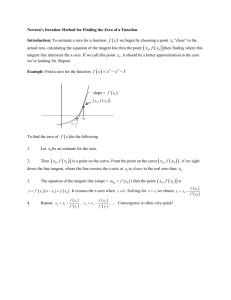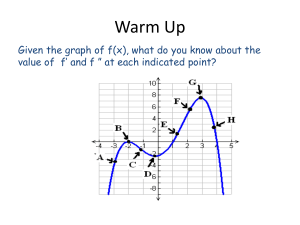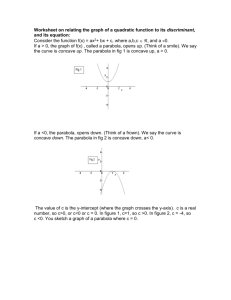Activity_3_1_5 - Connecticut Core Standards
advertisement
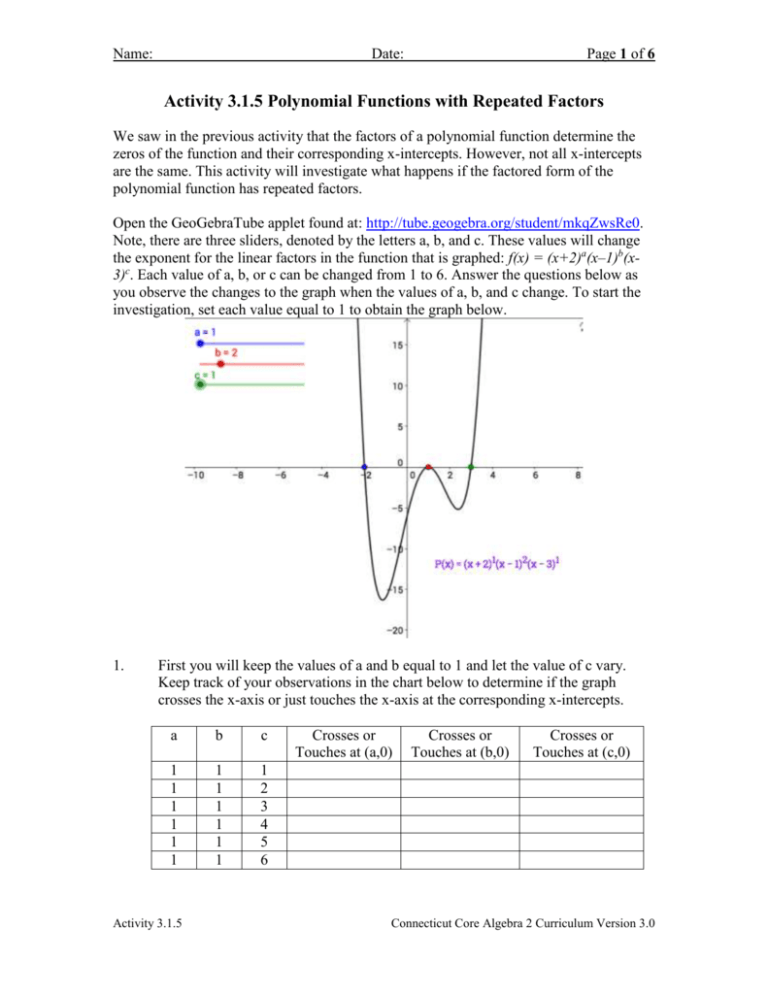
Name: Date: Page 1 of 6 Activity 3.1.5 Polynomial Functions with Repeated Factors We saw in the previous activity that the factors of a polynomial function determine the zeros of the function and their corresponding x-intercepts. However, not all x-intercepts are the same. This activity will investigate what happens if the factored form of the polynomial function has repeated factors. Open the GeoGebraTube applet found at: http://tube.geogebra.org/student/mkqZwsRe0. Note, there are three sliders, denoted by the letters a, b, and c. These values will change the exponent for the linear factors in the function that is graphed: f(x) = (x+2)a(x–1)b(x3)c. Each value of a, b, or c can be changed from 1 to 6. Answer the questions below as you observe the changes to the graph when the values of a, b, and c change. To start the investigation, set each value equal to 1 to obtain the graph below. 1. First you will keep the values of a and b equal to 1 and let the value of c vary. Keep track of your observations in the chart below to determine if the graph crosses the x-axis or just touches the x-axis at the corresponding x-intercepts. a b c 1 1 1 1 1 1 1 1 1 1 1 1 1 2 3 4 5 6 Activity 3.1.5 Crosses or Touches at (a,0) Crosses or Touches at (b,0) Crosses or Touches at (c,0) Connecticut Core Algebra 2 Curriculum Version 3.0 Name: Date: Page 2 of 6 2. What is the relationship between the exponent of the linear factor (x–3) and whether the graph crosses or touches the x-axis? 3. Now keep the values of a and c equal to 1 and let the value of b vary. Keep track of your observations in the chart below to determine if the graph crosses the xaxis or just touches the x-axis at the corresponding x-intercepts. Before registering the results, predict what you think will happen and then verify your prediction using the GeoGebraTube applet. a b c 1 1 1 1 1 1 1 2 3 4 5 6 1 1 1 1 1 1 Crosses or Touches at (a,0) Crosses or Touches at (b,0) Crosses or Touches at (c,0) 4. Make a conjecture about the connection between the exponent of the linear factor of the polynomial function, the x-intercept of the graph, and whether the graph crosses the x-axis or just touches the x-axis. 5. Test your conjecture by setting b and c to 1 and letting a vary. Did you confirm or reject your conjecture? Activity 3.1.5 Connecticut Core Algebra 2 Curriculum Version 3.0 Name: 6. Date: Page 3 of 6 For each of the following functions, identify the degree of the polynomial, the end behavior, the x-intercepts of the function and whether the graph crosses the x-axis or just touches the x-axis at each x-intercept. Then estimate what you think the basic shape of the function will be on the axes provided. Use a graphing utility to verify your answer for each problem before you move on to the next function. a. 𝑓(𝑥) = (𝑥 + 3)2 (𝑥 + 1)1 (𝑥 − 2)3 Degree: End Behavior: x-intercepts: Crosses x-axis or Touching x-axis: Estimated Graph: Activity 3.1.5 Connecticut Core Algebra 2 Curriculum Version 3.0 Name: Date: b. Page 4 of 6 𝑓(𝑥) = −.2𝑥(𝑥 − 1.5)2 (𝑥 + 2)2 Degree: End Behavior: x-intercepts: Crosses x-axis or Touching x-axis: Estimated Graph: Activity 3.1.5 Connecticut Core Algebra 2 Curriculum Version 3.0 Name: 7. Date: Page 5 of 6 Using the information you have now learned, create each of the following functions with the given properties: a. Create a function of degree 4 composed of all linear factors that has two xintercepts and such that the graph crosses the x-axis at each x-intercept. Estimate the graph on the axes provided. b. Create a function of degree 5 composed of all linear factors that has three xintercepts and such that the graph crosses the x-axis at each x-intercept. Activity 3.1.5 Connecticut Core Algebra 2 Curriculum Version 3.0 Name: Activity 3.1.5 Date: Page 6 of 6 Connecticut Core Algebra 2 Curriculum Version 3.0
